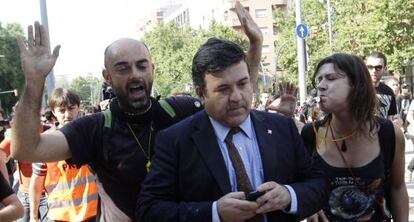How much abuse can a politician take?
Public figures from all parties have seen an increase in verbal and sometimes physical aggression Angry voters are making their feelings heard, but are they crossing a red line?

Pere Navarro, leader of the Catalan branch of the Socialist Party (PSC), was assaulted a week or so ago outside the cathedral of Terrassa, the city where he served as mayor for a decade (2002-2012).
Because he was there for a family event, Navarro did not bring bodyguards along. All of a sudden, a woman who looked around 50, wearing expensive clothes and jewelry, made a beeline for the politician, screamed “Bon dia, grandíssim fill de puta” (“Good morning, you massive son-of-a-bitch!” in Catalan) and punched him on the cheek. Then she ran off, leaving bystanders in shock.
Navarro told the people around him to let her go, and nobody knows who she is or why she did it. But the PSC immediately took the incident to be an example of the tension that has been created in Catalonia over the independence drive by nationalist parties – something that the Socialists reject – and the lack of dialogue between Catalan premier Artur Mas, of CiU, and Prime Minister Mariano Rajoy, of the center-right Popular Party (PP).
It later transpired that Navarro has also been insulted and even received death threats in recent weeks.
While the punch-in-the-face episode has been condemned by all political parties in Catalonia, the nationalists and leftists have asked the PSC not to jump to conclusions. Only the PP agrees that the sovereignty drive is to blame.
Social fracture lines run so deep in Catalonia that some families are unable to celebrate Christmas together
Its regional leader, Alicia Sánchez-Camacho, noted that it has taken an assault to get Navarro to talk about the tension in the air. “We’ve been denouncing this for months,” she said. “We need to rethink this. The independence movement is a divisive issue, and is putting a strain on society.”
This is certainly the feeling of Interior Minister Jorge Fernández Díaz, who was called “fascist” by a woman as he walked out of a bar in Barcelona recently. In December, the minister had stated that the social fracture lines ran so deep in Catalonia that some families were unable to celebrate Christmas together.
Meanwhile a fellow PSC member, Jaume Collboni, contradicted his leader by saying: “I haven’t noticed any tension in the air. I walk down the streets of Barcelona quite calmly.”
“There are very lively debates,” said Francesc Homs, spokesman for the Catalan government. “There is political tension, but democrats are neither afraid nor worried about debates.”
Insults, boos and vulgar comments are nothing new to politicians. It is at the heart of democracy for citizens to feel free to express their anger at politicians who let them down.
In Greece politicians could not walk out their front doors”
But each one of them has an extreme story to tell: Esteban González Pons, a PP official, was hit by an egg outside Raval theater in Castellón just hours after Navarro got punched. But a red line is crossed when insults turn into physical attacks. Josep Sánchez-Llibre, a deputy for the Catalan party Unió, ended up in a Madrid hospital after being violently shaken, then thrown to the ground, by a score of far-right protesters who screamed out “Cataluña es España” (Catalonia is Spain).
“Insults come with the job. You have to walk around in the other person’s shoes,” said Sánchez-Llibre in Congress recently. “But assaults are something else, and they are all to be condemned. Having said that, it is a serious mistake to blame an entire society for a criminal act. It’s as though I had said that I was attacked because Madrid’s society is tense due to opposition to the sovereignty bid. Instead we said the opposite: that it did not represent Madrid society. In my 20 years in Madrid, nothing had ever happened to me. It was an isolated incident.”
The conservatives have their own share of stories to tell. Alejo Vidal-Quadras, now a candidate for Vox, a new party that seeks to steal votes away from the PP, was insulted during the Olympic Torch run. Rodrigo Rato, then deputy prime minister, and Josep Piqué, then head of the Catalan PP, had to take refuge inside a parking lot to avoid being lynched by a mob in Barcelona three days after the March 11, 2004 Islamist bomb attacks against commuter trains in Madrid.
Former Catalan premier José Montilla, a Socialist, was nearly attacked during a 2010 street demonstration protesting the Constitutional Court’s unfavorable ruling on the regional charter; his party colleague Miquel Iceta got an egg thrown at his head on election night in 2012, and former Barcelona mayor Jordi Hereu was slapped twice by an angry resident.
Josep Curto, a former PP spokesman in the regional parliament, recalls getting hit by tomatoes once, and by rotten eggs another time. “They got my suit jacket dirty and I stuck it in the trunk of the car so the horrible stench would not be in the air during my entire trip between Barcelona and Tortosa. It was months before it went entirely away,” he says.
I want people to keep seeing me go to the theater or the movies”
Curto believes that the tension in Catalonia back then, when there was popular anger at the government’s plans to transfer water from the Ebro River to areas further down the Mediterranean coast, was similar to what is happening now.
“There is actually a lot of political debate now, even if some people want to pass it off as tension,” he says.
But this is not the official PP line. In recent years the center-right party has registered damage to 70 of its Catalan offices. Regional party leader Camacho has received death threats, and once, as she was picking up her son after school, two men came up to her and told her to leave Catalonia.
Fernando Vallespín, a professor of political science at Madrid’s Autónoma University, associates anger at politicians with times of crisis, and believes that the height of this anger was felt between 2012 and early 2013, when Spain’s cost of borrowing in the international markets shot through the roof and two major corruption scandals erupted involving the PP and a member of the royal household, Iñaki Urdangarin.
“In Greece politicians could not walk out of their front doors,” he notes. “This was not the case in Spain, but it is true that there was a time when they were insulted and things could get uncomfortable at restaurants. But this has passed.”
But Ramón Jauregui, a Basque Socialist, believes that Navarro’s diagnosis is essentially correct.
“It is the result of a radicalized political climate in which extreme options are put on the table. Obviously, it reminds me of what happened in the Basque Country,” says Jauregui, who served in the Basque government in the late 1980s and mid-1990s and has had first-hand experience with nationalist extremism. “I don’t want to compare, but it’s the same homogenizing vision of the fanaticism that surrounds nationalism.”
Meanwhile, Navarro says he does not want any extra police protection: “I want people to keep seeing me go to the theater, the movies, or out for a stroll.”
Tu suscripción se está usando en otro dispositivo
¿Quieres añadir otro usuario a tu suscripción?
Si continúas leyendo en este dispositivo, no se podrá leer en el otro.
FlechaTu suscripción se está usando en otro dispositivo y solo puedes acceder a EL PAÍS desde un dispositivo a la vez.
Si quieres compartir tu cuenta, cambia tu suscripción a la modalidad Premium, así podrás añadir otro usuario. Cada uno accederá con su propia cuenta de email, lo que os permitirá personalizar vuestra experiencia en EL PAÍS.
¿Tienes una suscripción de empresa? Accede aquí para contratar más cuentas.
En el caso de no saber quién está usando tu cuenta, te recomendamos cambiar tu contraseña aquí.
Si decides continuar compartiendo tu cuenta, este mensaje se mostrará en tu dispositivo y en el de la otra persona que está usando tu cuenta de forma indefinida, afectando a tu experiencia de lectura. Puedes consultar aquí los términos y condiciones de la suscripción digital.









































